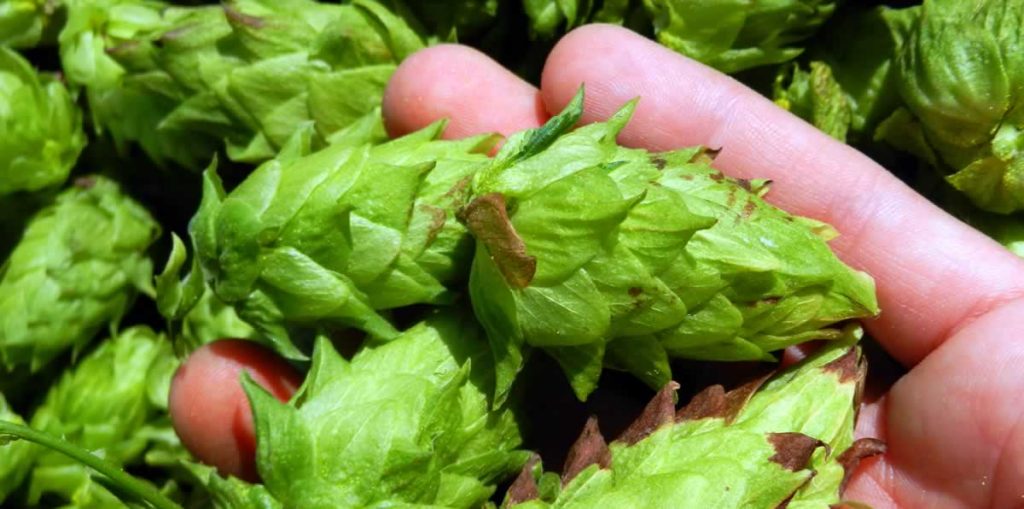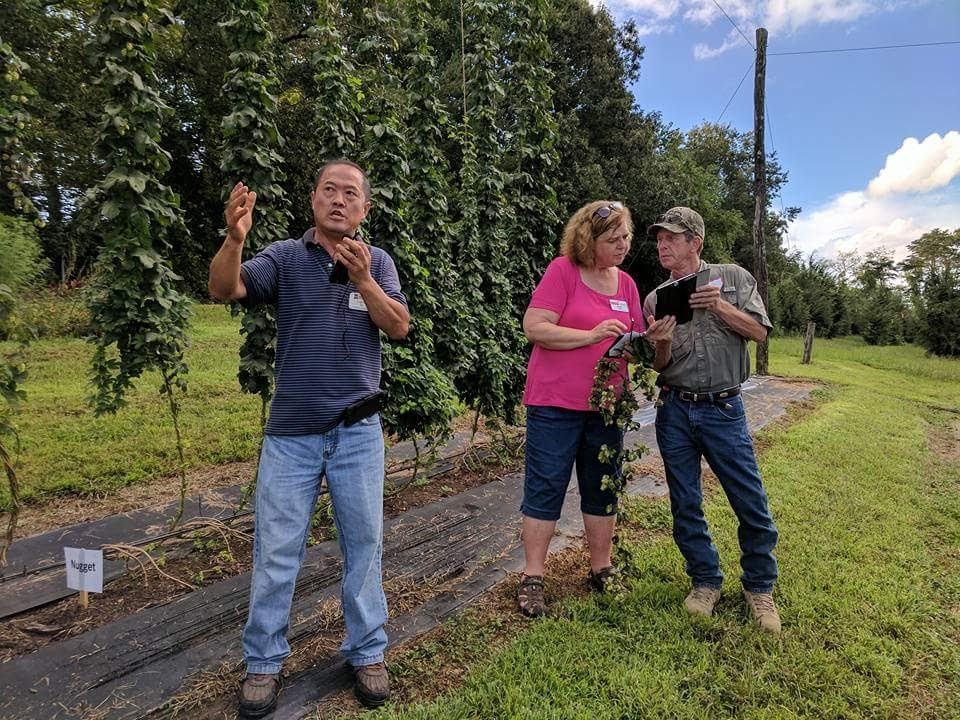North Carolina Hops
go.ncsu.edu/readext?464884
en Español / em Português
El inglés es el idioma de control de esta página. En la medida en que haya algún conflicto entre la traducción al inglés y la traducción, el inglés prevalece.
Al hacer clic en el enlace de traducción se activa un servicio de traducción gratuito para convertir la página al español. Al igual que con cualquier traducción por Internet, la conversión no es sensible al contexto y puede que no traduzca el texto en su significado original. NC State Extension no garantiza la exactitud del texto traducido. Por favor, tenga en cuenta que algunas aplicaciones y/o servicios pueden no funcionar como se espera cuando se traducen.
Português
Inglês é o idioma de controle desta página. Na medida que haja algum conflito entre o texto original em Inglês e a tradução, o Inglês prevalece.
Ao clicar no link de tradução, um serviço gratuito de tradução será ativado para converter a página para o Português. Como em qualquer tradução pela internet, a conversão não é sensivel ao contexto e pode não ocorrer a tradução para o significado orginal. O serviço de Extensão da Carolina do Norte (NC State Extension) não garante a exatidão do texto traduzido. Por favor, observe que algumas funções ou serviços podem não funcionar como esperado após a tradução.
English
English is the controlling language of this page. To the extent there is any conflict between the English text and the translation, English controls.
Clicking on the translation link activates a free translation service to convert the page to Spanish. As with any Internet translation, the conversion is not context-sensitive and may not translate the text to its original meaning. NC State Extension does not guarantee the accuracy of the translated text. Please note that some applications and/or services may not function as expected when translated.
Collapse ▲
About the Original North Carolina Hops Project
Spurred on by the demands of a burgeoning craft brewing industry and a strong public interest in locally grown ingredients, farmers are experimenting with hops (Humulus lupulus) as an alternative income source. Over the past fourteen years, an increasing community of growers across North Carolina and the entire South Atlantic region have established hop yards and sold their products to local craft breweries and home brewers. The majority of information and figures regarding hops production in the U.S. is developed for the Pacific Northwest hops industry and is not intended for the unique agronomic, economic, and environmental conditions found in Southeast. The objective of this project was to help identify the best performing hop cultivars, evaluate and develop appropriate cultural practices, evaluate promising geographic areas for hops production, address the key issues related to nutrition, disease, and pest control, build a Southeastern hops community, and provide educational materials and programming. In addition, local market conditions and production costs were addressed. As it became clear that the major limiting factor to the development of a North Carolina hops industry was the lack of suitable commercial varieties, the project evolved into a hops breeding project.
The NC Hops Breeding Project
Learn more about Breeding Hop Varieties for North Carolina,the 2019 Hops Breeding Update, and the latest 2024 Hops Breeding Update.
________________________
How it all started: the 2010-2012 NC Hops Project
In 2010, with support from the Golden Leaf Foundation, Rob Austin and Scott King in the Soil Science Department (now Crop and Soil Sciences) and Jeanine Davis in the Department of Horticultural Science, collaborated on a hops research project. An experimental hop yard was established at the Lake Wheeler Road Field Laboratory in Raleigh, North Carolina. It included 200 total hops plants on 1/4 of an acre. The hop yard contained 10 different U.S. hops varieties planted randomly throughout the experimental site. The varieties were selected based on their range of alpha acid content (bitterness), yield potential, disease and pest resistance, total U.S. production, and demand by local craft breweries. The site was designed to test which hop varieties are best suited for North Carolina’s unique growing conditions and which varieties offer the greatest potential for commercial production. After two growing seasons, the varieties planted show significant variation in their vigor, height, yield, maturity times, pest and disease resistance, and overall agronomic health. For example, while 7 of the 20 plants of the variety ‘Zeus’ were at the top of the 12 foot trellis and producing cones, the tallest ‘Northern Brewer’ was 6 feet, visually stressed, and without cones. Although variation was expected during the establishment year and additional research is needed, it is clear that variety selection plays a significant role in the economic viability of locally grown hops.
Due to changes in workforce, the hop yard at Lake Wheeler was dismantled after the close of the 2012 growing season. Efforts shifted to the research hop yard in the mountains at the Mountain Horticultural Crops Research and Extension Center in Mills River. Established in 2011, this variety trial initially included most of the same varieties as the original trial at Lake Wheeler. Additionally, collaborations continued with growers across the state. The growers worked with us to help monitor, test, and analyze various agronomic conditions and their significance throughout the growing season. These pioneering growers provided an opportunity to analyze the agronomic requirements and disease and pest pressures of hop yards managed under different strategies, in different stages of establishment, and in a different region within the state. This research hop yard still exists.
The information in this section is from that initial 2010-2012 hops project.
Hops Presentations
- Growing Hops in North Carolina: Variety Trials in the Central Piedmont and Southwestern Mountains of North Carolina 2012 ASHS Poster Presentation
- Evaluation of Hop Cultivars for Commercial Production in North Carolina 2014 ASHS Poster Presentation
- Growing Hops in the Southeastern US: 2014 South Atlantic Hops Conference PowerPoint Presentation
- Growing Hops in the Southeastern US: 2015 South Atlantic Hops Conference Video Presentations
- Growing Hops in the Southeastern US: 2016 South Atlantic Hops Conference Video Presentations
More information about hops and other hot crops.
Reviewed and updated by Jeanine Davis on 12/20/2024



